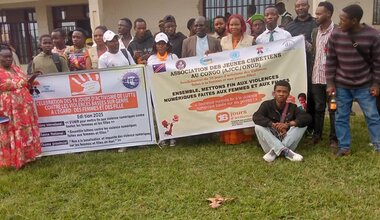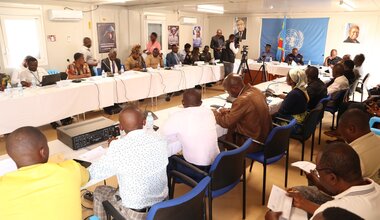Goma Urban Council signs the Paris Declaration on HIV
Goma, 11 June, 2017 - The Goma Urban Council, in the Democratic Republic of the Congo (DRC), has signed the Paris Declaration on HIV. The official signing ceremony was presided over by the Deputy Mayor on Friday, 9 June, 2017 at the Goma Town Hall. The Paris Declaration is an international initiative that seeks to encourage municipal authorities to look for better and effective ways to fight against HIV in their municipalities. It also aims to enabling more people to know their HIV status through voluntary HIV testing and to fight against discrimination often faced by people living with HIV in most communities. The ceremony was led by HIV/AIDS Section of MONUSCO and witnessed by UNAIDS, National AIDS Control Committee (PNMLS), international NGOs, UN Agencies, Orphans of AIDS, and the population of Goma.
At the ceremony, the Chief of HIV/AIDS Section, Juvenal Nshimiyimana, said that this initiative comes from the desire to encourage the Congolese public, especially the vulnerable community, to take notice of the issues surrounding HIV and AIDS and to take this opportunity to think about its deeper impact on their lives.
In his remarks, Juvenal referred to the signing of Paris Declaration on HIV as a major step forward in the fight against HIV and AIDS in the DRC, which he says is a constant preoccupation of the United Nations in general and of MONUSCO in particular. He used the occasion to present the United Nations Security Council Resolution creating the HIV/AIDS Section in Peacekeeping Missions, saying that their activities fall within the framework of integrating HIV and AIDS concerns in the Mission mandate.
“The HIV/AIDS Sections offers training on HIV and AIDS and technical support to the local community,” he observed while expressing the determination of MONUSCO to address outstanding issues aimed at eliminating discrimination and prejudice against people living with HIV.
Speaking at the ceremony, the Deputy Major thanked MONUSCO and other stakeholders for helping Goma Urban Council to sign the Paris Declaration, confirming that the AIDS epidemic is a major public health problem within their municipality.
“In collaboration with other partners, we will use every available means to protect the population through HIV sensitization,” he says. “The massive turn out of the population is evidence of the good relation that exists between the people of Goma and MONUSCO,” he confirmed.
While promising their constant collaboration, the Mayor called on MONUSCO to further fight against HIV in Goma and to promote a better understanding of the epidemic among the vulnerable community including women and children.
The representative of UNAIDS for North and South Kivu Provinces said that the signing of the Paris Declaration on HIV was a common initiative taken by the international community in France during commemorations marking the 2014 World AIDS Day. Apart from looking for ways to give adequate response to HIV in urban areas, he explains that this joint initiative also aims at fighting against tuberculosis, hepatitis, malaria, and other transmissible diseases.
“Our commitment is to reduce new HIV infections, and the number of AIDS-related deaths,” he said. “We are ensuring access to HIV test, treatment, care, and preventive services,” he reveals, confirming the determination of UNAIDS to put an end to HIV-related stigma and discrimination.
While painting the real picture of HIV and AIDS in the North Kivu Province, the Executive Secretary of PNMLS says, “One of the objectives of this declaration is to bring AIDS epidemic to an end by the year 2030.” He called on other partners involved in the fight against HIV to join in planning similar activities in Beni and Butembo municipalities.
According to a news release made public by the HIV/AIDS Section, MONUSCO equally collaborates with national institutions, the civil society, Non-governmental Organizations, associations of people living with HIV, private sector, religious institutions, and other UN agencies in order to strengthen national response to HIV and advocates an adequate response to the unprecedented challenge of AIDS in the DRC and around the world.
By Joseph Tabung Banah
 UN
UN United Nations Peacekeeping
United Nations Peacekeeping






